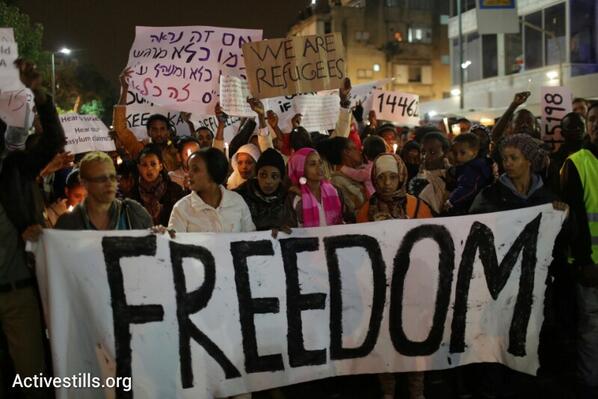Thousands of African migrants and Israeli human rights activists protested in Tel Aviv on Saturday night, in a “march for freedom” aimed at raising awareness at Israeli government policy to detain and jail asylum seekers without checking refugee status.

The march began at Lewinsky Park in south Tel Aviv, making its way to Rabin Square.
Last Saturday’s demonstration came days after migrants staged marches in protest of their detention at the newly established Holot facility in the south.
Earlier this month, close to 130 migrants protested the arrests of their fellows, who were apprehended by police during a gathering in front of the Prime Minister’s Office.
Since mid-December, 480 African migrants, mostly from Eritrea and Sudan, were transferred to Holot, which is located in the Negev desert and can hold as many as 3,000.
On December 15, 250 migrants fled Holot for a sit-in in Jerusalem to demonstrate against rules keeping them in the detention center. Hundreds of migrants were arrested during the sit-in.
Holot replaces the Saharonim prison complex, where migrants have been held up until this month. The new facility, where the terms of the migrants’ detention are somewhat more lax than at Saharonim, was erected after Israel’s Supreme Court ruled that incarcerating the migrants without trial for up to three years, as was previously the standard, was unconstitutional.
As a signatory of the United Nations Convention Relating to the Status of Refugees, Israel cannot deport asylum seekers if they face danger in their country of origin and, as such, grants Eritreans collective protection, but does not recognize them as refugees.
However, Israel has pursued a controversial option of “voluntary deportation,” in which migrants agree to leave, either to their country of origin or a third country, in exchange for monetary compensation.
On Thursday, according to figures obtained by the Interior Ministry, Channel 2 reported that an estimated 300 migrants — mostly from South Sudan and Eritrea — were expected to leave Israel in the course of December.
Overall, almost 2,000 of the tens of thousands of migrants who entered Israel illegally, seeking refugee status and/or work, will have left under the program in the course of 2013, according to the report. Their departure was encouraged by the payment to each migrant who leaves of a $3,500 stipend.
In February, a group of some 25 Eritrean migrants said they were pressured by Israeli immigration officials to sign a declaration saying they would agree to be deported to Uganda and then discovered that they were scheduled to fly to Eritrea, human rights group Hotline for Migrant Workers charged. The Eritreans refused to get on the plane.
Israel has largely stemmed the flow of African migrants into the country by upgrading the border fence with Egypt, but has sparked controversy over its handling of arrivals’ refugee claims — very few of which are upheld — and is grappling with fierce opposition in some quarters to the migrants’ presence, notably in southern Tel Aviv neighborhoods where many live.
Note: This was first posted on The times of Israel on 28 December 2013
